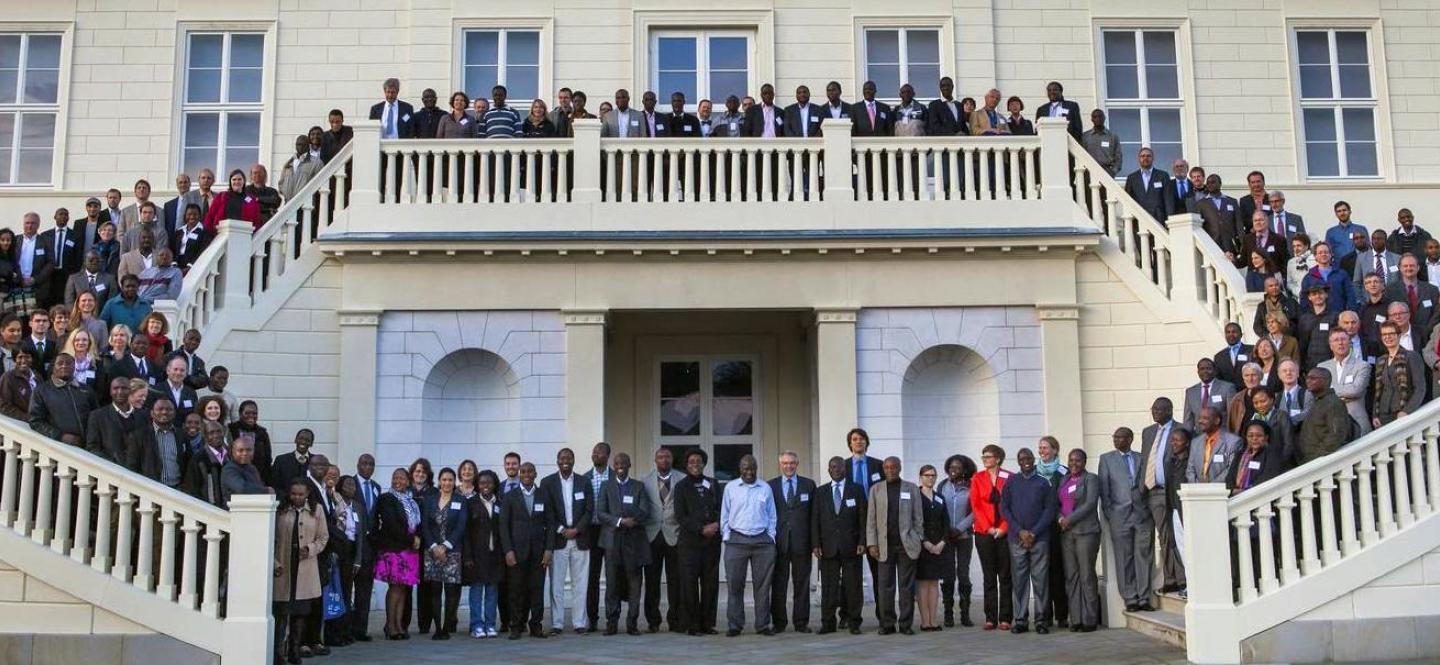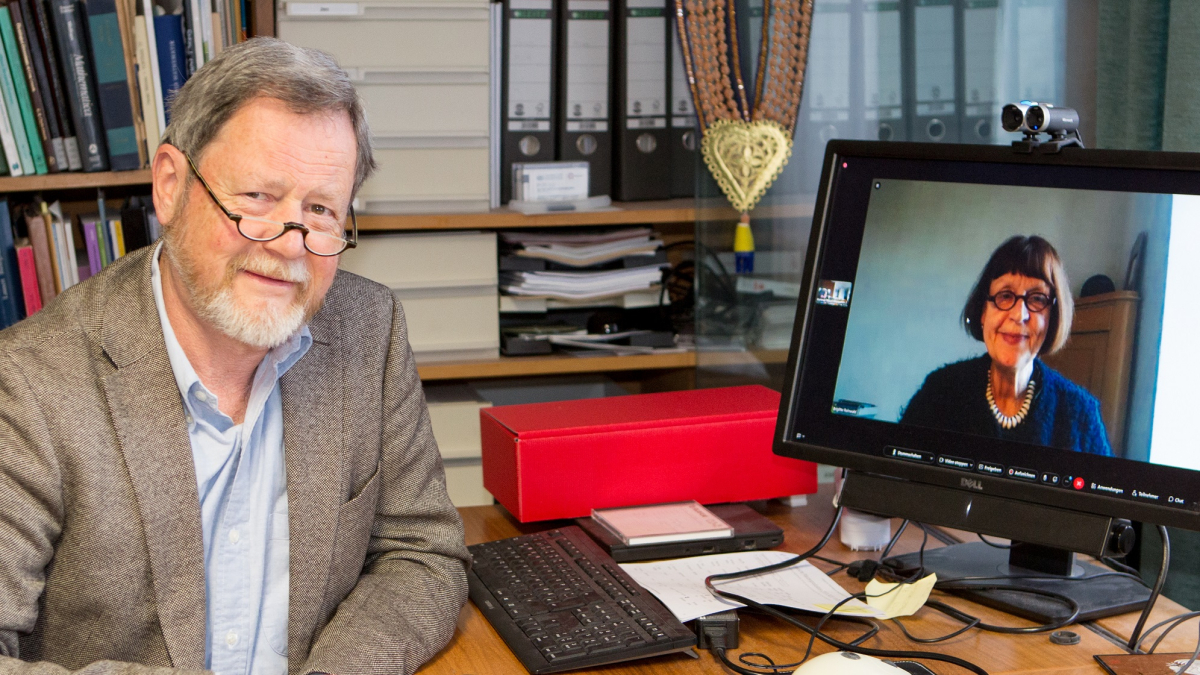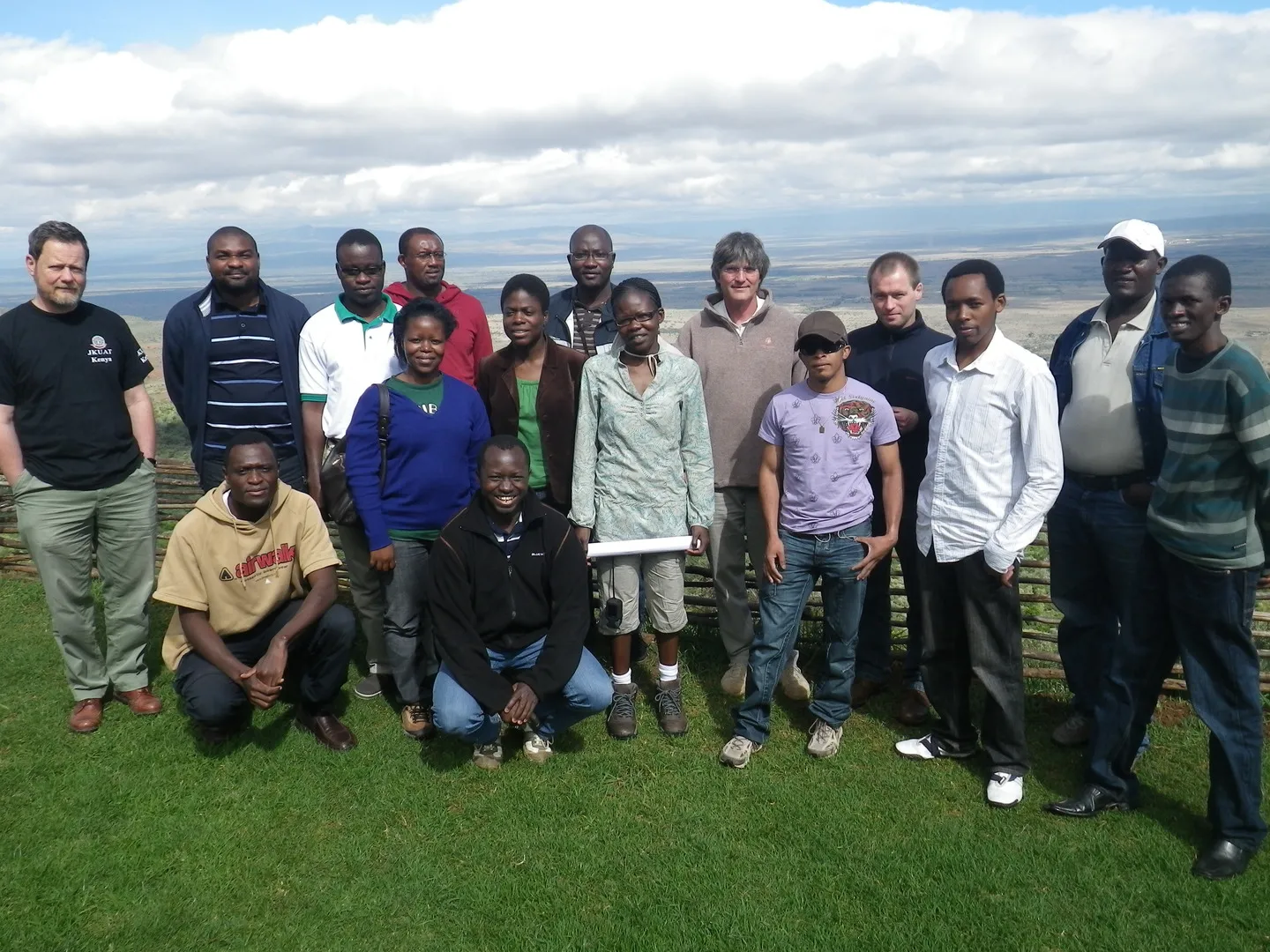Supporting science in Sub-Saharan Africa: Knowledge for tomorrow with multiplier effect
#International focus
Marcel Wogram für VolkswagenStiftung
Meeting of Grantees of the sub-Saharan Africa initiative in Herrenhausen Palace, Hannover (2013)
The Foundation supported research in sub-Saharan Africa through the funding of fellowships and cooperation projects. In this interview, two of the German coordinators describe their experiences.
Professor Reinwald, Professor Stützel, over a ten-year period you coordinated the activities of the fellows in your respective disciplines who were supported in two of the initiative's calls. What motivated you to take on this task?
Hartmut Stützel: With this funding initiative, the Volkswagen Foundation filled a gap that I long considered to be most regrettable: although good funding opportunities existed for students and doctoral candidates from Africa, there was simply no way for postdocs to become more independent and pursue their own research interests directly after their doctorate. I thought it was a brilliant idea to address this gap.
Brigitte Reinwald: Personally, I was also attracted by the opportunity to find out more about the situation in anglophone academic communities in eastern and southern Africa. My previous research had mainly brought me into contact with francophone communities. Apart from that, I had noticed that at many universities it is the postdocs who do most of the operational work – especially in the area of teaching. This systematically prevents them from getting research projects off the ground. The high student numbers and the comparatively lower levels of staffing and funding in the humanities exacerbate the problem.
Stützel: There is a lot of pressure on universities in Africa to accept students, not least in order to finance themselves. Funds for research are limited and infrastructures are poorly developed. Talented and highly motivated early career academics who were well trained at universities in Germany, for example, have no option other than to teach upon their return. After a few years, they become lost to research.

Hartmut Stützel (left) and Brigitte Reinwald (online-video) spoke with science journalist Ulrike Schneeweiß (not in picture).
What worked particularly well in the funding initiative?
Reinwald: In my group of fellows, which has remained relatively stable over the years, I have observed enormous leaps in qualification. Fresh PhDs developed into renowned postdoctoral scholars, and the multiplier effect was also very strong: the fellows produced very qualified masters and PhD students. And their international visibility increased enormously due to publications in peer-reviewed journals.
Did you also experience disappointments?
Stützel: Yes. For example, I supervised two fellows who, in my view, deserved further support after the first round of funding. However, due to their teaching obligations, they simply did not have the time to publish as well. In respect of the further funding decision, I would have liked to have been able to contribute my insights into the situation of the people concerned. After all, we coordinators could see the motivation and the commitment of the fellows.
Would it have been possible or necessary to reduce the pressure on the fellows or to lower the bar for publication accomplishments?
Stützel: I personally traveled to some of the universities involved to talk to the management and see if something could be done about the problem. But we were unable to influence the internal structures. Our fellows were at the bottom of the pecking order.
Reinwald: After all, though, it is their publication output that establishes the fellows' academic visibility. Overcoming this hurdle must therefore be one of their most important goals. However, many bow to the pressure to remain at the university beyond the project period and, if necessary, to pursue the tenure track.

Fellows of the Humanities call in St. Louis, among them: program manager Hanna Denecke and coordinator Brigitte Reinwald (2nd row, from left).
I think the fellows were often faced with the decision of what they should use the grant for. For example, one of my group started to build a social anthropology research institute during his junior fellowship. The workload, of course, severely restricted his capacity to publish. But he saw the opportunities that lay in building a forward-looking, research-based field at his university. In doing so, he created a very valuable resource – for example, for NGOs fighting Islamic extremism. Despite not making it to the senior fellow round, he is now highly visible and effective in his field.
Did the program have potential to bring change to the structures?
Stützel: A funding program on this scale will not start a revolution, but the principle of "constant dripping wears away the stone" certainly applies.
Reinwald: In my opinion, the potential of a funding program or research fellows to bring about change in the humanities must be considered in the overall context of the growing structural pressure under which these disciplines have been moved more and more onto the defensive. Africa is no exception. The continent has witnessed a noticeable marginalization of the qualitative humanities and social sciences over the past decade. It will take initiatives beyond research funding to raise awareness about how this area of science is doing – namely, not well at all – and to straighten out the situation.
Which effect did the heterogeneity of the participants from different countries have?What hurdles did you have to overcome?
Stützel: The considerable heterogeneity of the fellows, in terms of country of origin as well as subject expertise, offered many opportunities for broadening horizons. I was impressed by the fellows' keen desire to learn about each other's situation. East African fellows, for example, were impressed by being able to travel to West Africa for the first time; and from an interdisciplinary point of view, they learned a lot from each other. The discussions, however, would occasionally have benefited by including more participants from related research fields who could dig a little deeper by asking specific questions from different perspectives.
Reinwald: That's why we invited members of the host universities to join our workshops, and this did produce a more rigorous discourse. In the humanities, the range of perspectives also encouraged the fellows to think outside their disciplinary boxes. After all, our common goal was to adopt an optimistic approach to areas such as urbanization, migration, and culture in their various manifestations with a view to harnessing the diversity and spirit of optimism on the continent.

Members of the fellowship program "Natural Resources" in Nairobi, Kenia (May 2011)
Was there anything that particularly impressed you?
Reinwald: Our first workshop after the corona-related restrictions was held in Hwange, Zimbabwe. On the edge of the national park, a funded archaeologist has excavated two stone-built settlements dating from the 12th to 15th centuries. Our entire group spent a week under the blazing hot sun exploring the ruins. To engage so intensively with archaeology was very exciting for the fellows from such diverse subjects as linguistics and social anthropology – and for me too. The shared view across disciplinary boundaries also prompted us to think more about how we can better communicate research results to the public.
Exchange and networking, as you describe them, were also goals of the initiative. To what extent has it been possible to establish intra-African and international networks?
Stützel: My fellows got together at an early stage to share their expertise in modern experimental methods of environmental research with as broad a group of students as possible. They developed summer schools for statistics, measurement, and evaluation methods, and the third will take place this year. In order to continue the established networks beyond the funding period, it makes sense to have a common mission.
Reinwald: We will copy this format from Professor Stützel's fellows! The summer schools are a good instrument for networking the next generation of masters and PhDs. And already the numerous connections between postdoc partners, institutional partners, German, and African mentors within the program have developed in all directions and show many positive effects. In the meantime, we are also considering a transatlantic component; a US university is very interested in working with us. Moreover, our pending workshops within the funding initiative offer excellent opportunities to get to know new potential partners.
What do you think is needed to improve the prospects for young African researchers in the long term?
Stützel: The funding initiative offered the great distinction in the African research landscape that the fellows could choose their own topics. Other third-party funds are generally small, and they are usually guided by external interests. Whoever wants to do research has to be guided by these.

Discussion panel during a Fellow meeting.
However, the opportunity to develop one's own research profile, personality and specific competencies is essential for a certain depth of work and for becoming internationally visible. African countries are beginning to establish their own research funding structures, but they are still very poorly resourced. To counteract the lack of continuity in the development of early career researchers, there should continue to be funding opportunities from outside Africa for postdoctoral research.
Reinwald: My commitment to research funding in Africa was often ridiculed by colleagues as charitable work. We need to raise an awareness in this country that there is sophisticated research in Africa too! It needs support in order to be able to tackle common, global issues. Ultimately, all parties involved will benefit from a greater appreciation of the potential of African universities and their highly motivated and capable young academics.
Grantees and funding experts meet in Naivasha, Kenya
From April 2 to 6, 2023, the Foundation organizes a final Grantees Meeting in Naivasha, Kenya. Together with the funded postdocs and (inter)national experts in research funding on the African continent, the central findings of the 20 years of engagement will be reflected upon and input for the further development of internationality in funding activities will be generated. Topics will include the role of research in the humanities in addressing global societal challenges; the freedom of research will be in focus, as will the opportunities and challenges of international research cooperation against the backdrop of the heterogeneous research and science systems in the region. Some of the fellows will also present the results of their current research projects.

